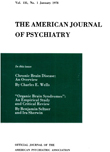CHARACTERISTICS OF POST-PARTUM MENTAL ILLNESS
Abstract
In our experience the most frequently encountered form of puerperal mental illness of sufficient gravity to require hospital care is the group of schizophrenic reactions. Many of these with a favorable outcome correspond to illnesses which were probably euphemistically and erroneously catalogued in much of the literature of the past three decades as toxic-exhaustive psychoses, and particularly non-toxic deliria.
In their beginning, relatively benign postpartum schizophrenic reactions may be very difficult to distinguish from the hard core of process schizophrenia and of relapsing schizoaffective reactions. The residuum of deteriorating and relapsing schizophrenic illnesses in similar therapeutic environments is proportionately the same whether or not these first developed in the puerperium. These results imply that process schizophrenia and some schizoaffective reactions beginning after delivery are purely coincidental psychoses. The better outlook for those schizophrenic reactions which tend to be self-limited and are accelerated toward a favorable conclusion by early energetic therapy suggests that the stresses entailed in achieving motherhood and being confronted with its new responsibilities act as a precipitating factor in some women predisposed to develop personality disorganization.
There seems to be an increasing incidence and recognition of serious, presumably functional mental disability of relatively favorable outcome arising in the puerperium which early in its course lacks the behavioral quality of schizophrenic reactions, is compatible with psychoneurotic depressive states, and is rapidly helped by short term intensive psychiatric treatment. In these cases the psychological stress of motherhood is a potent precipitating and partially causative factor. These reactions occur in certain women who react when loss of personality integrity is threatened with a fairly blatant display of psychoneurotic behavioral symptoms.
About half of our patients who made a good long-term recovery from an initial postpartum mental illness subsequently had one or more children without recurrence. All those in our study classified as having a good outcome have remained well during an observation period averaging more than 7 years.
We find that in a similar population in the same therapeutic milieu there is a somewhat better long-term outlook for recovery in puerperal as contrasted with similarly diagnosed mental reactions unassociated with childbearing.
Access content
To read the fulltext, please use one of the options below to sign in or purchase access.- Personal login
- Institutional Login
- Sign in via OpenAthens
- Register for access
-
Please login/register if you wish to pair your device and check access availability.
Not a subscriber?
PsychiatryOnline subscription options offer access to the DSM-5 library, books, journals, CME, and patient resources. This all-in-one virtual library provides psychiatrists and mental health professionals with key resources for diagnosis, treatment, research, and professional development.
Need more help? PsychiatryOnline Customer Service may be reached by emailing [email protected] or by calling 800-368-5777 (in the U.S.) or 703-907-7322 (outside the U.S.).



